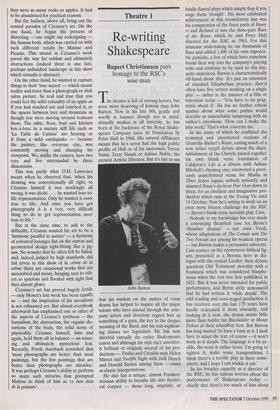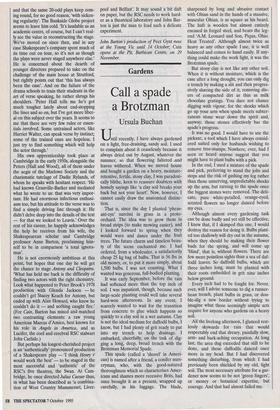Theatre 1
Re-writing Shakespeare
Rupert Christiansen pays homage to the RSC's wise man The theatre is full of unsung heroes, but none more deserving of honour than John Barton. Now in his late 60s, gentle and woolly in manner though not in mind, absurdly modest in all sincerity, he has been at the backbone of the Royal Shake- speare Company since its foundation by Peter Hall in 1960. His natural diffidence means that he's never had the high public profile of Hall or of his successors Trevor Nunn, Terry Hands or Adrian Noble, the present Artistic Director. But it's fair to say John Barton that his wisdom on the matter of verse drama has helped to inspire all the major talents who have passed through the com- pany: actors and directors regard him as something of a guru, the key to the deeper meaning of the Bard, and his text-explicat- ing classes are legendary. He has now directed virtually the entire Shakespeare canon and although his style isn't assertive- ly brilliant or original, several of his pro- ductions — Troilus and Cressida with Helen Mirren and Twelfth Night with Judi Dench and Donald Sinden among them — stand as classic interpretations. He also has a unique, almost Franken- steinian ability to breathe life into theatri- cal corpses — those long, ungainly, or fatally flawed plays which simply flop if you stage them 'straight'. His most celebrated achievement in this resuscitatory line was his compression of the three parts of Henry vi and Richard HI into the three-part Wars of the Roses, which he and Peter Hall directed for the RSC in 1963. For this immense undertaking he cut thousands of lines and added 1,400 of his own impecca- ble pastiche, a few of which have somehow found their way into the company's playing texts and continue to be used to this day, quite unnoticed. Barton is characteristically off-hand about this: 'It's just an extension of standard Elizabethan practice: they'd often have five writers working on a single play' — rather in the manner of a film or television script — 'You have to be prag- matic about it.' He has no further ethical qualms about what some purists would describe as unjustifiable tampering with an author's intentions. 'How can I make the play work? That's what concerns me.'
In the name of which he conflated the censored and uncensored versions of Granville-Barker's Waste, cutting much of a now rather turgid debate about the dises- tablishment of the Church; pasted together his own blank verse translation of Calderon's Life is a Dream with Adrian Mitchell's rhyming one; uncovered a previ- ously unperformed scene for Masha in Three Sisters (again, nobody noticed); and slimmed Ibsen's six-hour Peer Gynt down to three, for an ebullient and imaginative pro- duction which runs at the Young Vic until 14 October. Now he's setting to work on an even more bizarre challenge for the RSC — Byron's blank-verse morality play, Cain.
Nobody to my knowledge has ever made a convincing theatrical case for Byron's 'chamber dramas' — not even Verdi, whose adaptations of The Corsair and The Two Foscari are among his weakest operas — but Barton makes a persuasive advocate. Cain centres on the eponymous biblical fig- ure, presented as a Byronic hero in dia- logue with the cynical Lucifer: their debate questions Old Testament morality with a frankness which was considered blasphe- mous when the text was first published in 1821. But it was never intended for public performance, and Byron airily announced that he had written it 'while drunk'. The odd reading and semi-staged production it has received over the last 170 years have hardly redeemed it from obscurity, and looking at it now, the drama seems little more than fodder for Blacicadder or Monty Python at their schoolboy best. But Barton has long wanted 'to have a bash at it. I shall have to adapt the text, of course — it won't work as it stands. The language is a bit ye- olde, the verse is rather loose. I'm going to tighten it, make some transpositions. I think there's a terrific play in there some- where, and I hope I can winIde it out.'
In his broader capacity as a director of the RSC, he has various worries about the performance of Shakespeare today — chiefly that there's too much of him about and that the same 20-odd plays keep com- ing round, for no good reason, 'with sicken- ing regularity'. The Bankside Globe project seems to leave him cold. 'It's laudable as an academic centre, of course, but I can't real- ly see the value in reconstructing the stage. We've moved on since then, and in any case Shakespeare's company spent much of its time out on tour, so it's not as though the plays were never staged anywhere else.' He is concerned about the dearth of younger directors prepared to take on the challenge of the main house at Stratford, but rightly points out that 'this has always been the case'. And on the failure of the drama schools to train their students in the art of verse speaking, he rather shrugs his shoulders. 'Peter Hall tells me he's got much tougher lately about end-stopping the lines and so on, but I've got more liber- al on this subject over the years. It seems to me that there are very few rules or essen- tials involved. Some untrained actors, like Harriet Walter, can speak verse by instinct; some of the trained ones are hopeless. I just try to find something which will help the actor through.'
His own apprenticeship took place at Cambridge in the early 1950s, alongside the Peters (Hall and Wood), all of them under the aegis of the Marlowe Society and the charismatic tutelage of Dadie Rylands, of whom he speaks with hesitant respect. 'He had known Granville-Barker and mediated what he wrote to us: that was very impor- tant. He had enormous infectious enthusi- asm too, but his attitude to the verse was to find a simple driving line through it. He didn't delve deep into the details of the text — for that we looked to Leavis.' Over the rest of his career, he happily acknowledges the help he receives from his wife, the Shakespearean scholar and Cambridge professor Anne Barton, proclaiming him- self to be in comparison 'a total ignora- mus'.
He is not enormously ambitious at this point, but hopes that one day he will get the chance to stage Antony and Cleopatra. 'What has held me back is the difficulty of finding two actors with the right chemistry. Look what happened to Peter Brook's 1978 production with Glenda Jackson — he couldn't get Stacey Keach for Antony, but ended up with Alan Howard, who knew he couldn't do it — and nothing caught fire.' (For Cain, Barton has mixed and matched two contrasting elements: a raw young American Marcus d'Amico, best known for his role in Angels in America, and as Lucifer, the cool and cerebral RSC stalwart John Carlisle.) But perhaps his longest-cherished project is an 'authentically' pronounced production of a Shakespeare play — I think Henry v would work the best' — to be staged in the most successful and 'authentic' of the RSC's five theatres, the Swan. At Cam- bridge, he once directed Julius Caesar thus, in what has been described as 'a combina- tion of West Country Mummerset, Liver- pool and Belfast'. It may sound a bit daft on paper, but the RSC needs to work hard- er as a theatrical laboratory and John Bar- ton is just the man to lead such a delicate experiment.
John Barton's production of Peer Gynt runs at the Young Vic until 14 October; Cain opens at the Pit, Barbican Centre, on 29 November.











































































 Previous page
Previous page